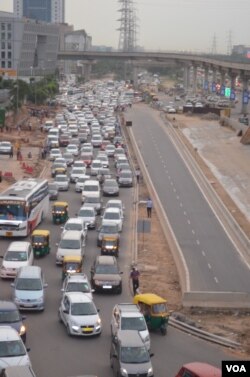The World Bank says India's economic growth will be hit in the wake of the currency ban, but the downturn will be short lived and the world’s fastest growing economy will soon be back on its feet.
The estimate came as India wooed overseas investors, with Prime Minister Narendra Modi saying India will become one of the world’s most digitized economies.
In a report released this week, the World Bank downgraded India’s economic forecast for the fiscal year that ends in March to 7 percent from 7.6 percent earlier. It attributed the “modest downgrade” to the withdrawal of nearly 86 percent of India’s currency two months back when high denomination notes were banned in a bid to flush out hoards of untaxed cash.
The estimates are in line with the government’s own projections, which say growth will slump by about half percent.
But in a forecast that will cheer Indian policymakers, the World Bank said growth will rebound soon. “India is expected to regain its momentum, with growth rising to 7.6 %in fiscal year 2018-19 and strengthening to 7.8% in fiscal year 2019-20,” the report said.
Critics have slammed the unexpected note ban as a measure that has severely disrupted an economy that works heavily on cash and warn that the adverse fallout will be prolonged.
Many, however, expect momentum to return soon. Economist N.R. Bhanumurthy at the National Institute of Public Finance and Policy points out that the immediate upside is the surge in bank deposits in the wake of the currency ban. “That can be circulated, that can be used for providing necessary resources for investment purposes and that can also lead to decline in interest rates,” he says.
Indeed, many sectors of the economy such as the automobile sector expect a quick recovery. As India reeled under a severe cash crunch, automobile sales witnessed the steepest decline in 16 years last December, falling by 300,000 vehicles compared to the previous year.
But director general of the Society of Indian Automobile Manufacturers, Vishnu Mathur, called it a “temporary blip.” The worst hit were sales of two-wheelers such as scooters, which are sold heavily in rural markets where cash shortages were the most severe.
In a sign the cash crunch is easing, the long lines seen for weeks outside banks have either shortened or are gone altogether, at least in the big cities.
That could be good news for business leaders from India and overseas who attended an investors summit in the western state of Gujarat this week.
India is promising them a cleaner economy in the wake of the currency ban. Calling India a bright spot in the world, Prime Minister Modi told potential investors that “creating an enabling environment for business and attracting investment is my top priority.”
Modi said “We are working to adopt and absorb newer technologies to bring about transparency. Believe me, we are on the threshold of becoming the world’s most digitized economies.”
Economists, however, warn that while the note ban may have flushed out illegal cash, cleaning up the economy will take time.
“We will see a slightly better transparent economy compared to what we had pre November 8th. We are not completely going to eliminate the informal economy, but I think demonetization (currency ban) would have substantially reduced the informal economy,” says economist Bhanumurthy.





